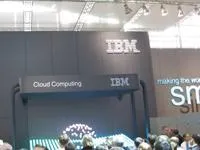
IBM, NTU to converge cloud computing, high performance computing
Partnership harnesses power of latest computing through NTU's High Performance Computing Centre for business.
IBM and the Nanyang Technological University (NTU) on Friday announced a collaborative effort to research and develop a platform for the convergence of cloud computing and high performance computing (HPC). The collaboration is intended to create solutions that will be ready for commercial adoption by engaging industries and commercial users, according to a report by IBM.
Leveraging its High Performance Computing Centre (HPCC), one of ASEAN's fastest and greenest supercomputer to-date, NTU will work with IBM to combine the strengths of cloud computing and HPC to further reinforce Singapore's position as a vibrant, global R&D hub engaged with innovative technologies and applied research relevant to industry adoption.
Foong Sew Bun, Chief Technologist of IBM Singapore, said: "This collaboration between IBM and NTU pushes the envelope of technology to test leading edge applications that will benefit faculty, students, and also business and government organisations that seek to leverage the power of cloud computing and high performance computing."
Professor Soh Yeng Chai, Associate Dean of College of Engineering, NTU said, "With this convergence of cloud computing and high performance computing, access by NTU faculty, research staff and students to HPC resources will be dramatically increased, accommodating different computing demands and workloads. This will place NTU at the forefront of high performance computing, and hopefully encourage SMEs as well as large organisations to leverage HPC-cloud computing."
According to IDC's Predictions for cloud services 2010, delivery of workload specific business services such as high performance analytics and high volume transaction processing based on rapidly maturing cloud services platforms is a trend that will provide tangible return on investment (ROI) to customers. As such, this collaboration reinforces IBM and NTU as forerunners in an upcoming technological platform with great commercial potential.
The collaboration follows NTU's participation as a charter member of the IBM Cloud Academy since November 2009. A global initiative available to all institutes of higher learning (IHL), the Academy empowers members to create working groups on areas of interest to the education industry and the industries they collaborate with; to “jam” on new innovations for cloud computing in education-related areas with IBM’s cloud computing experts, and to work jointly on technical projects across institutions, share research findings and exchange new ideas for research and education.
A vital aspect of the IBM Cloud Academy is the development of new technologies and research methods, which this collaboration fully supports.
While this initiative will enable the entire faculty of NTU to embark on HPC and cloud computing projects relevant to the different departments supporting various industries (engineering, mathematical sciences, finance/business, medical and pharmaceutical research, and so on), it will begin initially with two target areas:
Interactive digital media (IDM)
Aligned to the Infocomm Development Authority of Singapore's (IDA) view that digital media and entertainment will open up new interactive and immersive possibilities and that Singapore should establish itself as a centre for the creation of interactive digital media technologies, the power of cloud computing and HPC will make it possible for students and media and entertainment companies alike to create content and services.
Business analytics
Technology - business analytics, in particular - will play a key role in shaping and transforming how institutions do business, as it gives them comparative advantage to capture the emerging growth opportunities for services in Asia.
The NTU-IBM collaboration will also boost several ongoing projects. For example, NTU's HPCC and NTU's School for the Art and Design Media have been working closely with IBM to provide a larger and more dynamic pool of computing power for animation and research projects. With the incorporation of HPC-cloud computing, parallel computations such as rendering and related activities can be made quicker and more dynamic. In addition, HPC-cloud computing will also enable student, faculty and staff to test and experiment software and concepts rapidly too.
IBM is also working with HPCC and NTU's College of Science and College of Engineering to explore how HPC-cloud computing can provide greater computing power, while lowering the barrier to entry to parallel computation. With this unique platform incorporating cloud computing and HPC, custom-build and computing-on-demand HPC environment for scientific and engineering environment is now available to users.
The collaboration is expected to push the frontier of cloud computing technology and help develop globally competitive local expertise that will be able to support commercial interests in cloud computing and HPC technology.



![SBR 5 Lorem Ipsum News 2 [8 May]](https://cmg-qa.s3.ap-southeast-1.amazonaws.com/s3fs-public/styles/exclusive_featured_article/public/2025-05/a_hand_pointing_to_a_futuristic_technology_5b87c9d0e3_3.png.webp?itok=M3Hf-9XR)
![SBR 4 Lorem Ipsum [8 May Top Stories]](https://cmg-qa.s3.ap-southeast-1.amazonaws.com/s3fs-public/styles/exclusive_featured_article/public/2025-05/a_hand_pointing_to_a_futuristic_technology_5b87c9d0e3_2.png.webp?itok=2m5Wl0MX)


![Exclusive three SBR 12 Lorem Ipsum [8 May]](https://cmg-qa.s3.ap-southeast-1.amazonaws.com/s3fs-public/styles/exclusive_featured_article/public/2025-05/a_hand_pointing_to_a_futuristic_technology_5b87c9d0e3_11.png.webp?itok=8kn_UIfA)
![SBR 3 Lorem Ipsum [ Exclusive 2]](https://cmg-qa.s3.ap-southeast-1.amazonaws.com/s3fs-public/styles/exclusive_featured_article/public/2025-05/a_hand_pointing_to_a_futuristic_technology_5b87c9d0e3_1.png.webp?itok=YCyjLegJ)
![SBR 2 Lorem Ipsum [8 May]](https://cmg-qa.s3.ap-southeast-1.amazonaws.com/s3fs-public/styles/exclusive_featured_article/public/2025-05/a_hand_pointing_to_a_futuristic_technology_5b87c9d0e3_0.png.webp?itok=_cKD-29o)

![Video [Event News]](https://cmg-qa.s3.ap-southeast-1.amazonaws.com/s3fs-public/styles/event_news_featured_article/public/2025-05/screenshot-2025-05-08-at-4.58.53-pm_0.png.webp?itok=Kud35sMs)
![Event News SBR 9 Lorem Ipsum [8 may]](https://cmg-qa.s3.ap-southeast-1.amazonaws.com/s3fs-public/styles/event_news_thumbnail/public/2025-05/a_hand_pointing_to_a_futuristic_technology_5b87c9d0e3_8.png.webp?itok=DTh_dbYp)
![Event News SBR 9 Lorem Ipsum [8 May]](https://cmg-qa.s3.ap-southeast-1.amazonaws.com/s3fs-public/styles/event_news_thumbnail/public/2025-05/a_hand_pointing_to_a_futuristic_technology_5b87c9d0e3_7.png.webp?itok=vzDAzb6V)
![Event News SBR 8 Lorem Ipsum [8 May]](https://cmg-qa.s3.ap-southeast-1.amazonaws.com/s3fs-public/styles/event_news_thumbnail/public/2025-05/a_hand_pointing_to_a_futuristic_technology_5b87c9d0e3_6.png.webp?itok=jvHFc4P6)
![Video [Event News]](https://cmg-qa.s3.ap-southeast-1.amazonaws.com/s3fs-public/styles/video_thumbnail/public/2025-05/screenshot-2025-05-08-at-4.58.53-pm_0.png.webp?itok=yZnI0YBb)
![Video 1 SBR [8 May]](https://cmg-qa.s3.ap-southeast-1.amazonaws.com/s3fs-public/styles/video_thumbnail/public/2025-05/screenshot-2025-05-08-at-4.58.53-pm.png.webp?itok=9AAeRz_k)

 Advertise
Advertise

